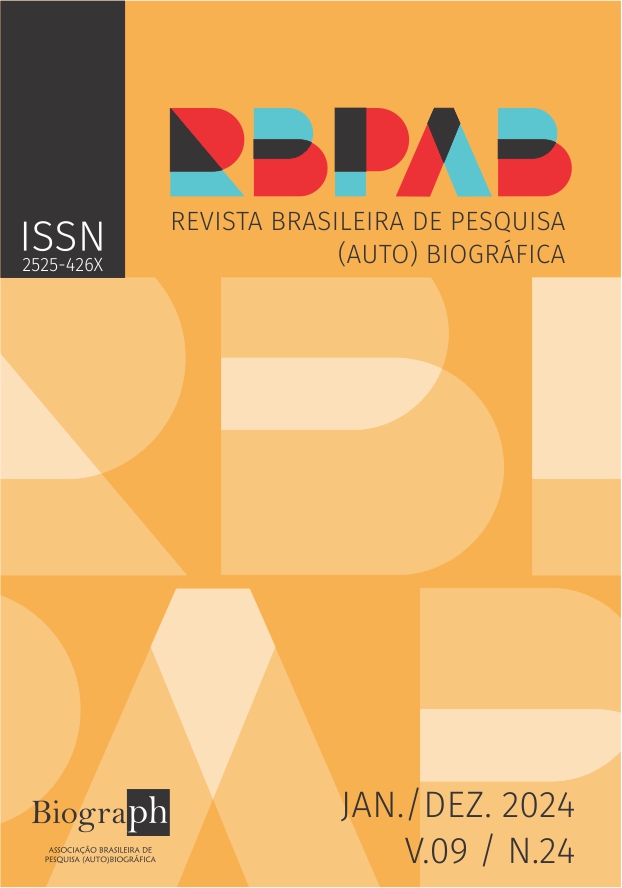Memories and experiences of a migrant with disabilities in higher education in Brazil
DOI:
https://doi.org/10.31892/rbpab2525-426X.2024.v9.n24.e1206Keywords:
Discrimination, Disability, Higher Education, Autobiographical narrativeAbstract
Higher Education in Brazil is developing actions to be increasingly inclusive. The presence of student diversity, the recognition of the need to prepare teachers, and research in this direction evidence some efforts that are being made. The central question that guides the research is: How does the university life of a deafblind and migrant student in Brazil unfold?. It aims to reflect on the gaze, analysis, and vision of a deafblind and migrant student in their entry, trajectory, and current situation in Higher Education in Brazil, based essentially on the narrative of their personal experience. Some legal frameworks and other theoretical assumptions about the inclusion of deafblind people are assumed. From a methodological point of view, it is based on the qualitative perspective with a focus on autobiographical narrative. Achievements, limitations, and segregations encountered during the pre-during, and post-pandemic period in their university life are shown. The narratives and events experienced conclude by recognizing advances in the inclusion of people with disabilities in the University, and learnings emerge that will lead to transforming certain practices of structural discrimination around people with disabilities, as well as giving voice to students in their training process.
Downloads
References
BRASIL. Decreto n° 6949. Promulga a Convenção Internacional sobre os Direitos das Pessoas com Deficiência e seu Protocolo Facultativo, assinados em Nova York, em 30 de março de 2007. Diário Oficial da União, Brasília, 25 ago. 2009. Disponíble en: http:// www.planalto.gov.br/ccivil_03/_ato2007-2010/2009/ decreto/d6949.htm. Acceso en: 19 mar. 2024.
CARILLO, Elenir Ferreira Porto. Análise das entrevistas de quatro surdocegos adquiridos sobre a importância do guia-intérprete no processo de comunicação e mobilidade. 2008. Disponíble en: http://tede.mackenzie.br/jspui/handle/tede/1709. Acceso en: 19 mar. 2024.
CEPAL. Situación de la discapacidad en América Latina y el Caribe, 2014. Disponível em: https://www.cepal.org/es/publicaciones/36906-informe-regional-la-medicion-la-discapacidad-mirada-procedimientos-medicion-la. Acceso en: 19 mar. 2024.
CEPAL. Panorama social de América Latina 2019, 2019. Disponíble en: https://www.cepal.org/es/publicaciones/44969-panorama-social-america-latina-2019. Acceso en: 19 mar. 2024.
CRUZ, G.; MAIA DE PAIVA, M.; LONTRA, V. A narrativa (auto)biográfica como dispositivo de pesquisa-formação na indução profissional docente. Revista Brasileira de Pesquisa (Auto)biográfica, [S. l.], v. 6, n. 19, p. 956–972, 2021. DOI: 10.31892/rbpab2525-426X.2021.v6. n19.p956-972. Disponíble en: https://www.revistas.uneb.br/index.php/rbpab/article/view/12666. Acceso en: 19 mar. 2024.
GALEANO, Isaías. Aventuras a ciegas. Boletim Kultrun, Foz do Iguaçu, Brasil. 2023. vol. 5, n. 1, p. 27-33. Disponíble en: https://www.boletimkultrun.com/ . Acesso em 19 mar. 2024.
GALVÃO, Nelma de Cássia Silva Sandes; MIRANDA, Therezinha Guimarães. Atendimento educacional especializado para alunos com surdocegueira: um estudo de caso no espaço da escola regular. Revista Brasileira de Educação Especial, Marília, v. 19, n. 1, p. 43-60, jan./ mar. 2013. Disponíble en: http://www.scielo.br/scielo. php?script=sci_arttext&pid=S1413-65382013000100004. Acceso en: 19 mar. 2024.
OMS y Banco Mundial. El Informe Mundial sobre la Discapacidad, 2011. Disponíble em: https://www.who.int/es/publications/i/item/9789241564182. Acceso en: 19 mar. 2024.
ONU. La Convención sobre los Derechos de las Personas con Discapacidad, 2006. Disponíble en: https://sid-inico.usal.es/legislacion/instrumento-de-ratificacion-de-la-convencion-sobre-los-derechos-de-las-personas-con-discapacidad-hecho-en-nueva-york-el-13-de-diciembre-de-2006/. Acceso en: 19 mar. 2024.
UNESCO. Declaración de Salamanca y Marco de Acción para Necesidades Educativas Especiales, conferencia Mundial sobre Necesidades Especiales: Acceso y Calidad, 1994. Disponíble en: https://unesdoc.unesco.org/ark:/48223/pf0000098427_spa. Acceso en: 19 mar. 2024.
UNICEF. Estudio Mundial sobre Discapacidad, 2013. Disponíble en: https://www.oas.org/es/sedi/ddse/paginas/documentos/discapacidad/DESTACADOS/ResumenInformeMundial.pdf . Acceso en: 19 mar. 2024.
UNESCO. Directrices sobre la Inclusión Educativa, 2009. Disponíble en: https://sidinico.usal.es/documentacion/directrices-sobre-politicas-de-inclusion-en-la-educacion/. Acceso en: 19 mar. 2024.
UNESCO. Marco de Acción para la Educación 2030, 2015. Disponíble en: https://www.se.gob.hn/media/files/articles/Marco_de_Accin_Educacin_2030_version_espanol.pdf . Acceso en: 19 mar. 2024.
UNESCO. La educación inclusiva: el camino hacia el futuro, 2017. Disponíble en: https://unesdoc.unesco.org/ark:/48223/pf0000180629_spa. Acceso en: 19 mar. 2024.
VILELA, Elaine Gomes. Surdocegos e os Desafios nos Processos Socioeducativos: os mediadores e a Tecnologia Assistiva. 2018. Disponíble en: http://tede. metodista.br/jspui/bitstream/tede/1810/2/Elaine%20 Gomes%20Vilela.pdf. Acceso en: 19 mar. 2024.
VILELA, E. G.; AZEVEDO, A. B.; RAMOS, M. H. A. Surdocegueira e as possibilidades em meio a pandemia por COVID-19. Revista Brasileira de Pesquisa (Auto)biográfica, [S. l.], v. 5, n. 16, p. 1563–1576, 2020. DOI: 10.31892/rbpab2525-426X.2020.v5.n16.p1563-1576. Disponíble en: https://www.revistas.uneb.br/index.php/rbpab/article/view/9225. Acceso en: 19 mar. 2024.













































